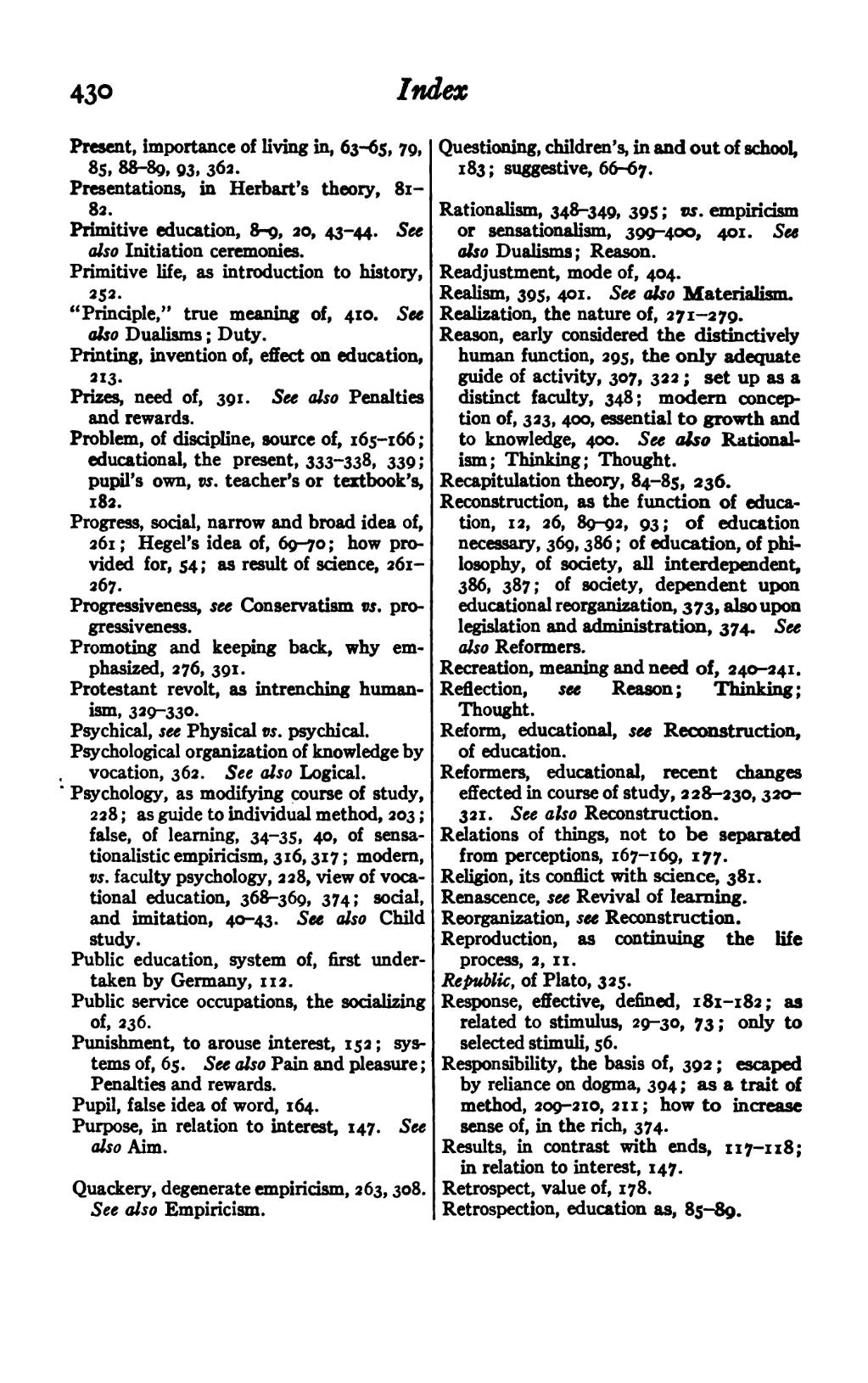Present, importance of living in, 63–65, 79, 85, 88–89, 93, 362.
Presentations, in Herbart's theory, 81–82.
Primitive education, 8–9, 30, 43–44. See also Initiation ceremonies.
Primitive life, as introduction to history, 252.
"Principle," true meaning of, 410. See also Dualisms; Duty.
Printing, invention of, effect on education, 213.
Prizes, need of, 391. See also Penalties and rewards.
Problem, of discipline, source of, 165–166; educational, the present, 333–338, 339; pupil's own, vs. teacher's or textbook's, 182.
Progress, social, narrow and broad idea of, 261; Hegel's idea of, 69—70; how provided for, 54; as result of science, 261–267.
Progressiveness, see Conservatism vs. progressiveness.
Promoting and keeping back, why emphasized, 276, 391.
Protestant revolt, as intrenching humanism, 329–330.
Psychical, see Physical vs. psychical.
Psychological organization of knowledge by vocation, 362. See also Logical.
Psychology, as modifying course of study, 228; as guide to individual method, 203; false, of learning, 34–35, 40, of sensationalistic empiricism, 316, 317; modern, vs. faculty psychology, 228, view of vocational education, 368–369, 374; social, and imitation, 40–43. See also Child study.
Public education, system of, first undertaken by Germany, 112.
Public service occupations, the socializing of, 236.
Punishment, to arouse interest, 152; systems of, 65. See also Pain and pleasure; Penalties and rewards.
Pupil, false idea of word, 164.
Purpose, in relation to interest, 147. See also Aim.
Quackery, degenerate empiricism, 263, 308. See also Empiricism.
Questioning, children's, in and out of school, 183; suggestive, 66–67.
Rationalism, 348–349, 395; vs. empiricism or sensationalism, 399–400, 401. See also Dualisms; Reason.
Readjustment, mode of, 404.
Realism, 395, 401. See also Materialism.
Realization, the nature of, 271–279.
Reason, early considered the distinctively human function, 295, the only adequate guide of activity, 307, 322; set up as a distinct faculty, 348; modern conception of, 323, 400, essential to growth and to knowledge, 400. See also Rationalism; Thinking; Thought.
Recapitulation theory, 84–85, 236.
Reconstruction, as the function of education, 12, 26, 89–92, 93; of education necessary, 369, 386; of education, of philosophy, of society, all interdependent, 386, 387; of society, dependent upon educational reorganization, 373, also upon legislation and administration, 374. See also Reformers.
Recreation, meaning and need of, 240–241.
Reflection, see Reason; Thinking; Thought.
Reform, educational, see Reconstruction, of education.
Reformers, educational, recent changes effected in course of study, 228–230, 320–321. See also Reconstruction.
Relations of things, not to be separated from perceptions, 167–169, 177.
Religion, its conflict with science, 381.
Renascence, see Revival of learning.
Reorganization, see Reconstruction.
Reproduction, as continuing the life process, 2, 11.
Republic, of Plato, 325.
Response, effective, defined, 181–182; as related to stimulus, 29–30, 73; only to selected stimuli, 56.
Responsibility, the basis of, 392; escaped by reliance on dogma, 394; as a trait of method, 209–210, 211; how to increase sense of, in the rich, 374.
Results, in contrast with ends, 117–118; in relation to interest, 147.
Retrospect, value of, 178.
Retrospection, education as, 85–89.
